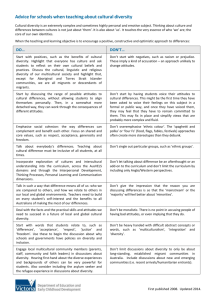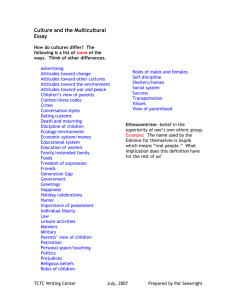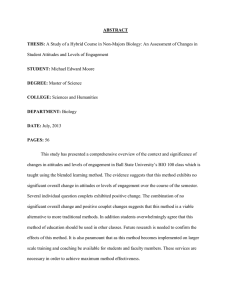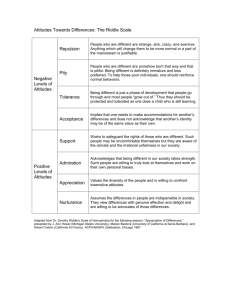Teacher’s Work Experience: Perceptions and Attitudes toward Reading and Writing... Critical Thinking (RWTC) Teaching Methodology
advertisement
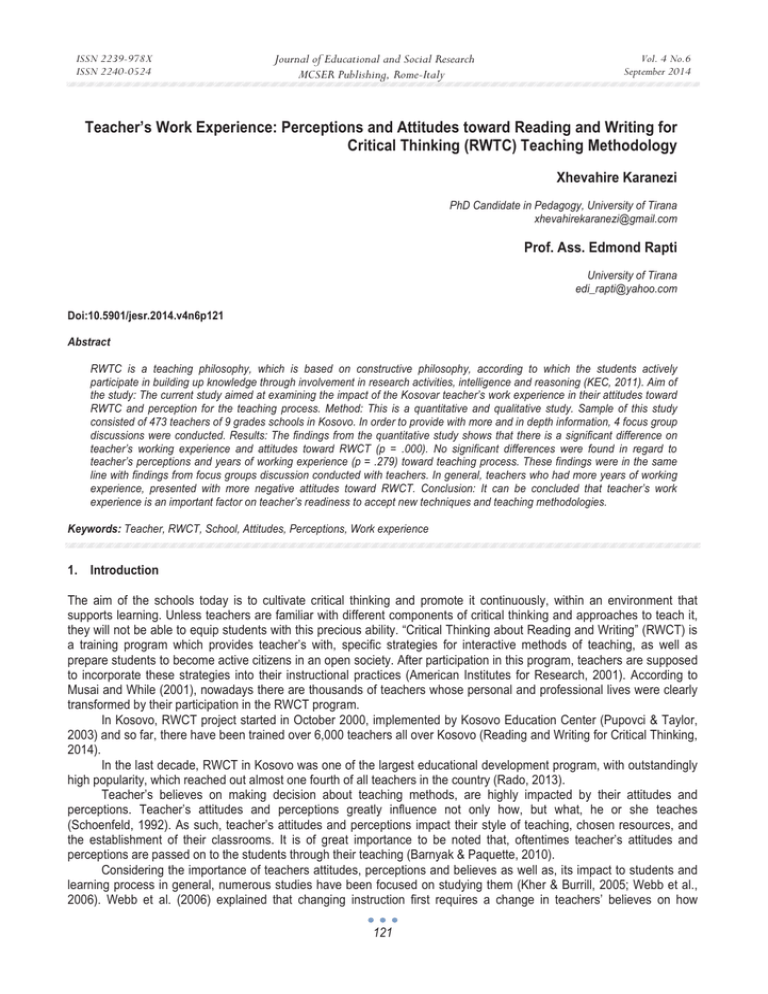
ISSN 2239-978X ISSN 2240-0524 Journal of Educational and Social Research MCSER Publishing, Rome-Italy Vol. 4 No.6 September 2014 Teacher’s Work Experience: Perceptions and Attitudes toward Reading and Writing for Critical Thinking (RWTC) Teaching Methodology Xhevahire Karanezi PhD Candidate in Pedagogy, University of Tirana xhevahirekaranezi@gmail.com Prof. Ass. Edmond Rapti University of Tirana edi_rapti@yahoo.com Doi:10.5901/jesr.2014.v4n6p121 Abstract RWTC is a teaching philosophy, which is based on constructive philosophy, according to which the students actively participate in building up knowledge through involvement in research activities, intelligence and reasoning (KEC, 2011). Aim of the study: The current study aimed at examining the impact of the Kosovar teacher’s work experience in their attitudes toward RWTC and perception for the teaching process. Method: This is a quantitative and qualitative study. Sample of this study consisted of 473 teachers of 9 grades schools in Kosovo. In order to provide with more and in depth information, 4 focus group discussions were conducted. Results: The findings from the quantitative study shows that there is a significant difference on teacher’s working experience and attitudes toward RWCT (p = .000). No significant differences were found in regard to teacher’s perceptions and years of working experience (p = .279) toward teaching process. These findings were in the same line with findings from focus groups discussion conducted with teachers. In general, teachers who had more years of working experience, presented with more negative attitudes toward RWCT. Conclusion: It can be concluded that teacher’s work experience is an important factor on teacher’s readiness to accept new techniques and teaching methodologies. Keywords: Teacher, RWCT, School, Attitudes, Perceptions, Work experience 1. Introduction The aim of the schools today is to cultivate critical thinking and promote it continuously, within an environment that supports learning. Unless teachers are familiar with different components of critical thinking and approaches to teach it, they will not be able to equip students with this precious ability. “Critical Thinking about Reading and Writing” (RWCT) is a training program which provides teacher’s with, specific strategies for interactive methods of teaching, as well as prepare students to become active citizens in an open society. After participation in this program, teachers are supposed to incorporate these strategies into their instructional practices (American Institutes for Research, 2001). According to Musai and While (2001), nowadays there are thousands of teachers whose personal and professional lives were clearly transformed by their participation in the RWCT program. In Kosovo, RWCT project started in October 2000, implemented by Kosovo Education Center (Pupovci & Taylor, 2003) and so far, there have been trained over 6,000 teachers all over Kosovo (Reading and Writing for Critical Thinking, 2014). In the last decade, RWCT in Kosovo was one of the largest educational development program, with outstandingly high popularity, which reached out almost one fourth of all teachers in the country (Rado, 2013). Teacher’s believes on making decision about teaching methods, are highly impacted by their attitudes and perceptions. Teacher’s attitudes and perceptions greatly influence not only how, but what, he or she teaches (Schoenfeld, 1992). As such, teacher’s attitudes and perceptions impact their style of teaching, chosen resources, and the establishment of their classrooms. It is of great importance to be noted that, oftentimes teacher’s attitudes and perceptions are passed on to the students through their teaching (Barnyak & Paquette, 2010). Considering the importance of teachers attitudes, perceptions and believes as well as, its impact to students and learning process in general, numerous studies have been focused on studying them (Kher & Burrill, 2005; Webb et al., 2006). Webb et al. (2006) explained that changing instruction first requires a change in teachers’ believes on how 121 ISSN 2239-978X ISSN 2240-0524 Journal of Educational and Social Research MCSER Publishing, Rome-Italy Vol. 4 No.6 September 2014 students learn and which are effective teaching strategies (Webb et al 2006). The National Reading Panel committee decided to research about teachers’ education preparation and analyzed three studies that were focused on improving teachers’ attitudes. The Panel found that teachers’ attitudes change when intervention occurs. This is important because, in order to change practices, attitudes must change first (National Reading Panel). The professional development experiences can affect teachers on changing their behaviors and attitudes about teaching and learning (American Institute for Research 2001). According to Barnyak and Paquette (2010) teachers have the tendency and often teach the way they were instructed and use prior experiences in school to mold their belief system. Also, they pointed out that although teachers learn new methods, they return to the strategies that they are most comfortable using (Barnyak & Paquette, 2010). 2. Methodology This is a quantitative and qualitative study. The sample of this study was constructed of primary school teacher’s from 1 to 9 grades of primary schools in Kosovo. In total, 473 teachers participated in this study both from urban and rural areas of Kosovo. The data were collected utilizing questionnaires compiled for this specific purpose. In order to have a better understand some of the issues, focus group discussions were conducted with primary school teachers. According to Krueger (1998) focus group discussions helps to better explore and understand the specific issues in a deeper level then quantitative methods. Moreover, focus group discussions helps the researchers to better understand participants’ perception, thoughts and feelings in regard to the specific issues (Krueger & Casey, 2000). Hence, in total 4 focus group discussions were conducted from which two focus group discussions were conducted with teachers who received RWCT trainings, and two focus group discussions were conducted with teachers who did not go through any RWCT training before. The focus group participants were also selected with respect to urban and rural area. 3. Participants Primary school teachers of grades 1 to 9 in Kosovo participated in this research study. In total 473 school teachers participated in this research from which 219 (46.3 %) teacher of primary school (grade 1-5) and 254 (53.7%) teacher of lower secondary school (grade 6-9). The study was conducted with participants from 23 primary schools in Kosovo, from 6 different regions with respect to urban and rural stratification. The data were collected in schools, where the questionnaires were administrated to the teachers who volunteered to participate in the study. In regard to the qualitative data collection, 4 focus group discussions were conducted. The focus group discussions were organized in schools and were comprised of 6 to 8 participants from different regions. Prior to the focus group discussions, the participants were asked to sign a consent form for participation in focus group discussion. 4. Instruments For the quantitative data collection, a specific questionnaire was compiled by the author in close collaboration with other experts of the field. Some of the questions were used and adapted by the questionnaire used for one of the studies conducted with Kosovar teachers previously (Pupovci & Taylor, 2003). Prior to the data collection, a pilot study was conducted in order to test the questionnaire. The pilot was conducted with teacher from two primary school which were not selected for the data collection. During the pilot study, teachers were asked to fill in the questionnaire and after that to give their feedback in a group discussion. As a result of the pilot, few questions were modified but there was no need to add or remove any question. In the group discussion, teachers’ declared that the questions were clear enough, comprehensive, and had a logical flow. All teachers’ recommendations were integrated in the final version of the questionnaire which was used for the main data collection. 5. Procedure of Data Collection The questionnaire was administrated in the school premises. The questionnaires were administrated in different rounds in small groups of teachers, in order for them to have enough physical space, and privacy. During the entire process of 122 ISSN 2239-978X ISSN 2240-0524 Journal of Educational and Social Research MCSER Publishing, Rome-Italy Vol. 4 No.6 September 2014 the data collection, teachers were informed and encouraged to ask if anything was unclear to them. The focus group discussions were conducted in school premises with 6 to 8 participants. The focus group discussions were conducted after teacher’s official working hours, in a separate physical space where nobody apart the research team had access to that. Prior to the start, participants were informed about the flow of the discussion, their right to withdraw and were encouraged to actively participate and contribute to the discussion. 6. Results Descriptive statistics about teacher’s years of experience grouped in three different categories are presented below: The figure above shows the work experience in years of teachers who participated in the study. As presented in the figure 36.2% of teachers had 1 to 10 years of work experience followed by 35.5% with 21 or more and 28.3% with 11 to 21 years of working experience. Table 2: Teacher’s attitudes toward RWCT and their perceptions for the teaching process by working experience. Attitudes toward RWCT Teacher's Perception Between Groups Within Groups Between Groups Within Groups Sum of Squares 1427.954 33401.102 83.071 15153.729 df 2 467 2 467 Mean Square 713.977 71.523 41.535 32.449 F 9.983 Sig. .000 1.280 .279 The data presented in the table above show differences between teacher’s attitudes and perceptions for the teaching process by their working experiences presented in years. The data presented in the table show that there is a significance differences between teacher’s working experience and their attitudes toward RWCT (p = .000). No significant difference was found between teacher’s working experience and their perceptions about the teaching process (p = .279). Table 2.1: Teacher’s attitudes toward RWCT and perceptions for the teaching process by working experience presented in mean scores. Attitudes toward RWCT Teacher's Perception 1 to 10 years 11 to 20 21 and more 1 to 10 years 11 to 20 21 and more N Mean Std. Deviation Std. Error 170 133 167 170 133 167 47.4353 48.4737 44.3533 48.0235 47.7444 47.0539 8.02503 7.59743 9.47354 5.85521 5.34656 5.80118 .61549 .65878 .73308 .44907 .46361 .44891 The data presented in the Table 2.1 show the mean scores for each group of teachers, grouped by their years of working experience. As presented in the table, teachers with 21 years and more work experience presented with more negative attitudes toward RWCT compare to the other groups (M=44.3) with less years of working experience. That there is no significant difference between teachers’ working experience and their perceptions about the teaching process is very clear also when looking at the mean scores between the three groups. It can be noted that teacher with 21 and more years of working experience showed very little or better say no difference (M = 47.0) compare to the other groups. 7. Findings from Focus Group Discussions Also, referring to the findings from the focus group discussions, it is noted that teachers’ who attended RWCT trainings and had more working experience, presented with more negative attitudes toward RWCT compare to the teachers with less years of working experience. Some of the teacher’s attitudes who declared having more working experience compare to the rest of the group are presented below: Participant 1 “I personally didn’t found RWCT techniques very useful because every activity brings a lot of noise in the class, as such the students are not able to understand anything and is very difficult to manage”. Participant 2 “Overcrowded and general conditions in the school are some of the main obstacles for me to use 123 ISSN 2239-978X ISSN 2240-0524 Journal of Educational and Social Research MCSER Publishing, Rome-Italy Vol. 4 No.6 September 2014 RWCT techniques with my students” Participant 3 “I feel very comfortable with the techniques I use and I learned as a student since I started teaching. I am experienced on that, and I know bests how to organize my lesson”. In general, teachers with more work experience compare to those with less years of work experience seemed to be more reluctant on accepting new teaching techniques including RWCT. Based on the discussions, they seemed more confident and proud with the work they did and continue doing which was built throughout their experience and education. 8. Discussion The aim of this study was to investigate the differences between teacher’s working experience, their attitudes toward RWCT and perceptions about teaching process. The results presented in this study show that there is a significant difference between teachers’ years of working experience and their attitudes toward RWCT compare to participants with less years of working experience. This is also explained by Barnyak and Paquette (2010), who stated that teachers have the tendency to use the way that they were instructed and use prior experiences in school. Based on the findings from focus group discussions with teacher’s, is important to be noted that teachers who had more negative attitudes toward RWCT attributed it to different reasons and conditions. As such, some of the teachers said that RWCT is not applicable because of the lack of crucial conditions within the schools that they work, overcrowding, and lack of physical space, noise, hard to manage the students, etc. One should be noted, that for some of the teacher’s with more working experience, the usage of new techniques was not necessary considering that the techniques they usually use during their entire work experience resulted to be very successful. Moreover, the study resulted with no significant differences in regard to teachers perceptions about the teaching process. Findings of this study are in line with what Barnyak and Paquette (2010) stated, according to them even though teachers learn new teaching methods and techniques, they return to the strategies and methods that they are most comfortable to use in their daily practices. 9. Conclusion Based on the results and findings presented in this study, it can be concluded that there is a significant difference between teacher’s years of working experience and their attitudes toward RWCT and its application. One should be noted that, teacher’s with 21 and more years of working experience declared more negative attitudes toward RWCT compared to the teacher’s with less years of working experience. Considering findings from the focus group discussions, it can be highlighted that teacher’s with more working experience tends to be more reluctant in accepting new techniques and teaching methodologies. References American Institutes for Research (2001) The 2000-2001 Reading and Writing for Critical Thinking. Project Impact and Institutionalization Study. Barnyak, N. C., & Paquette, K. (2010). An investigation of elementary preservice teachers reading instruction beliefs. Reading Improvement. Farmington Hills, MI: Gale Group. Kosovo Education Centre (2011). Working Report 2010. Prishtinë. Krueger, R. A. (1998). Moderating focus groups. Thousand Oaks, CA: Sage Publications. Krueger, R., & Casey, M. (2000). Focus Groups. A Practical Guide for Applied Research (3rd Edition). Thousand Oaks: Sage Publications. Musai, B. & Wile, J.M. (2001). Reading and Writing for Critical Thinking Program as Professional Development: Creating other ways of seeing ourselves. European Conference on Reading, Dublin, Ireland, July 1-4 Pupovci, D., & Taylor, A. (2003). Reading and Writing for Critical Thinking, Final Evaluation Report, Kosovo Education Centre. Prishtinë. Rado. P (2013). The Evaluation of the Reading and Writing for Critical Thinking Program in Kosovo. Final Evaluation Report. Reading and Writing for Critical Thinking (2014) Schoenfeld, A. H. (1992). Learning to think mathematically: Problem solving, metacognition, and sense-making in mathematics. In D. Grouws (Ed.), Handbook for Research on Mathematics Teaching and Learning (pp. 334-370). New York, NY: MacMillan Webb, N. M., Nemer, K. M., & Ing, M. (2006). Small-group reflections; Parallels between teacher discourse and student behavior in peer-directed groups. Journal of the Learning Sciences, 15, 63-119. 124

